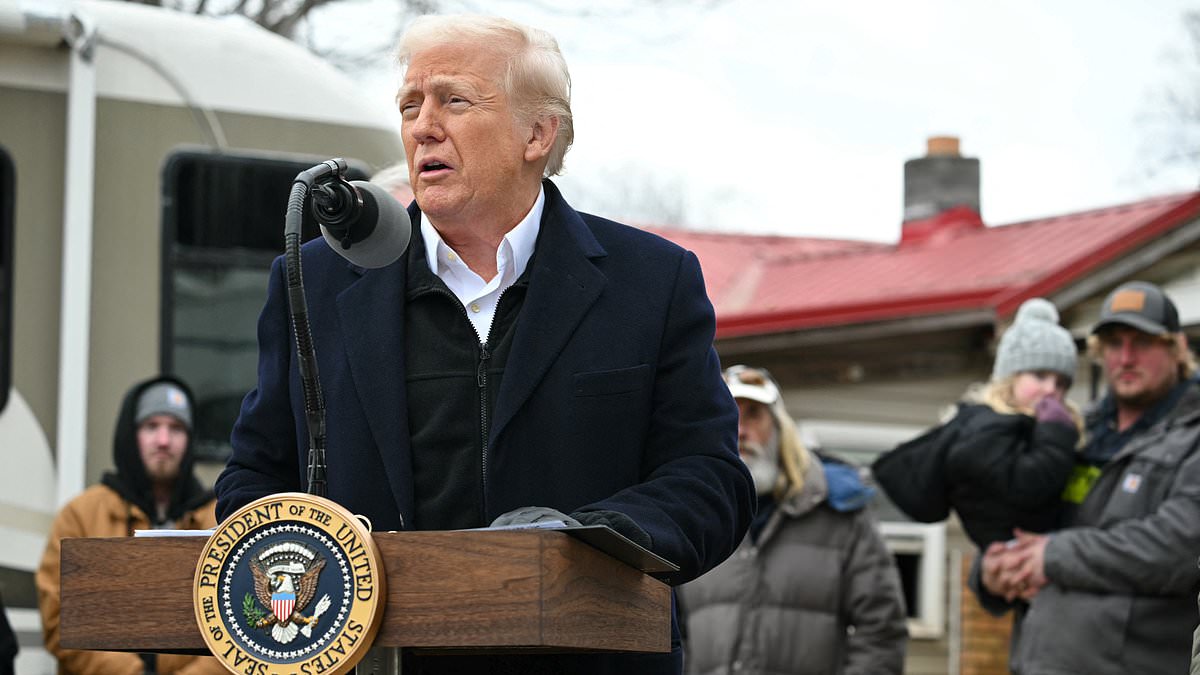President Donald Trump on Sunday issued an executive order establishing a review council to evaluate the Federal Emergency Management Agency (FEMA), although stopping short of instant action to shut down the country’s lead disaster response agency.
The order calls for the establishment of council made up of relevant federal leaders and ‘distinguished individuals’ selected by Trump from outside government.
Trump called on the council to hold its first public meeting within 90 days and submit a report to him within 180 days of the first meeting.
The president raised the idea of shuttering FEMA during a cross-country trip on Friday to disaster areas in North Carolina and California, vowing to sign an executive order to overhaul or eliminate the agency.
‘FEMA has turned out to be a disaster,’ he said during a tour of a North Carolina neighborhood destroyed by September’s Hurricane Helene.
‘I think we recommend that FEMA go away.’
The Republican president accused FEMA of bungling emergency relief efforts there and said he preferred that states be given federal money to handle disasters themselves.
Trump said in his executive order that there were ‘serious concerns’ of political bias at FEMA and that agency funds had been used for programs related to incoming migrants.
FEMA brings in emergency personnel, supplies and equipment to help areas begin to recover from natural disasters.
Funding for the agency has soared in recent years as extreme weather events have increased the demand for its services.
Cam Hamilton, the acting FEMA head, wrote to staff on Friday reassuring them that the agency’s continued existence was vital to the country’s disaster response efforts.
‘FEMA is a critical agency which performs an essential mission in support of our national security,’ he wrote.
Hamilton is a former Navy SEAL Trump appointed to temporarily lead the agency after the Republican president took office last week.
The agency in the past year has battled misinformation, including about disaster responses in Florida and North Carolina.
Its reputation was battered by its poor handling of Hurricane Katrina in 2005, and the agency has struggled to recover. Trump criticized FEMA on the campaign trail and since taking office on Monday.
FEMA has a workforce of 20,000 people that can swell to more than 50,000 active members during major disasters, according to its website. It has 10 regional offices and the capacity to coordinate resources from across the federal government.
Officially created in 1979, it became part of the Department of Homeland Security in 2004.
While responding to real-life disasters, FEMA has also battled a slew of false rumors about how its funds have been used.
Before his re-election, Trump and his Republican allies accused former President Joe Biden and Vice President Kamala Harris, the Democratic candidate for president, of using federal emergency money to help people who were in the country illegally.
U.S. Representative Marjorie Taylor Greene went as far as to say government officials control the weather.
FEMA has been the target of so many falsehoods it has set up a rumor response page on its website to tamp them down.
One entry addresses the accusation that FEMA diverted funs to the border.
‘This is false. No money is being diverted from disaster-response needs. FEMA´s disaster-response efforts and individual assistance is funded through the Disaster Relief Fund, which is a dedicated fund for disaster efforts. Disaster Relief Fund money has not been diverted to other, non-disaster related efforts.’
The agency has been criticized for emergency responses to hurricanes that fell short, including Hurricane Maria in Puerto Rico in 2017.
Residents accused then-President Trump of being slow to dispatch aid after Maria and clumsy in his public remarks once it was clear the U.S. territory had been devastated.
In 2005, Hurricane Katrina battered New Orleans and flooded parts of the city as residents crowded into ill-prepared shelters.
Katrina devastated the Gulf of Mexico coast and caused more than 1,800 deaths. It also shattered the reputation of FEMA, which was sharply criticized for its response.
